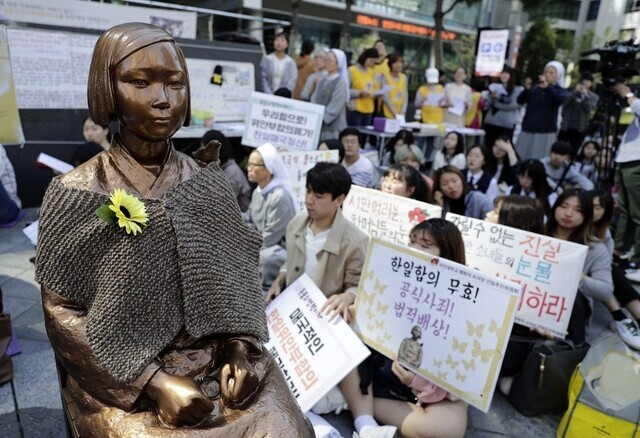hankyoreh
Links to other country sites 다른 나라 사이트 링크
[Editorial] Japan’s choice to erase truth of atrocities from history textbooks is deplorable

On Tuesday, the Japanese government once again erased the truth from its history books.
The results of the Japanese Ministry of Education, Culture, Sports, Science and Technology’s evaluation of textbooks released that day showed that all references to “forced labor” by Koreans and women being forced to serve as sexual slaves to the Japanese military were omitted from 239 high school history, political science, economics, and geography textbooks.
Most of the textbooks also repeated the absurd claim that the island of Dokdo is Japanese territory. This reflected a Cabinet decision made by the Japanese government in April 2021.
In the Kono Statement issued in 1993, the Japanese government acknowledged its military’s involvement in the sexual enslavement of so-called “comfort women” and the forcible nature of their “mobilization.” It pledged to use education on history to ensure that these facts would not be forgotten — but since then, it has been moving in the exact opposite direction.
At a time when South Korea and Japan are in desperate need of reconciliation and cooperation, it’s deplorable that the Japanese government is not only failing to teach future generations the proper lessons of history, but also compounding the distortions over time.
Even Jikkyo Shuppan — which published the only one of the authorized Japanese history textbooks to explicitly identify the responsible parties in its text and use the term “Japanese military comfort women” to refer to the victims — has now dropped the “Japanese military” part and is simply referring to “comfort women.” Similarly, the references in textbooks to “forced relocation” of victims have been replaced with simply “mobilization.”
With the Japanese government bowing to the arguments of right-wingers and decreeing in its April 2021 Cabinet decision that the use of the term “forced relocation” was inappropriate, now even the one publishing company that had been accurate in its accounts has accepted the historical distortion.
In a statement the same day lambasting the omissions, the Asia Peace and History Education Network said, “Since the [Shinzo] Abe administration, the Japanese government had been peddling the argument that there was ‘no physical compulsion’ in the mobilization of Japanese military ‘comfort women.’”
“Now they have reached the point of denying the military’s involvement by deleting the concepts of ‘serving the Japanese military’ from their textbooks,” it continued.
In its own statement, the South Korean government said, “We express our deep regret at [Japan’s] authorization of high school textbooks that distort historical facts based on a self-centered historical perspective, and we urge corrective action.” The South Korean Ministry of Foreign Affairs summoned Naoki Kumagai, deputy chief at the Japanese Embassy in South Korea, to lodge a stern protest.
With the global order undergoing major upheavals and the East Asian political situation in a precarious state amid Russia’s invasion of Ukraine and the battle for dominance between the US and China, many in both South Korea and Japan are stressing that the two sides need to improve their relationship and cooperate as key neighbors.
Yet the Japanese government’s move to change its history textbooks for the worse comes on the heels of its push to register the Sado mines — a site of forced mobilization of Korean workers during the occupation — on the UNESCO World Heritage List.
We urge the Japanese government to stop engaging in historical distortions and to adopt a responsible attitude for the sake of a future-oriented South Korea-Japan relationship.
Please direct questions or comments to [english@hani.co.kr]

Editorial・opinion
![[Column] Life on our Trisolaris [Column] Life on our Trisolaris](https://flexible.img.hani.co.kr/flexible/normal/500/300/imgdb/original/2024/0505/4817148682278544.jpg) [Column] Life on our Trisolaris
[Column] Life on our Trisolaris![[Editorial] Penalties for airing allegations against Korea’s first lady endanger free press [Editorial] Penalties for airing allegations against Korea’s first lady endanger free press](https://flexible.img.hani.co.kr/flexible/normal/500/300/imgdb/original/2024/0502/1817146398095106.jpg) [Editorial] Penalties for airing allegations against Korea’s first lady endanger free press
[Editorial] Penalties for airing allegations against Korea’s first lady endanger free press- [Editorial] Yoon must halt procurement of SM-3 interceptor missiles
- [Guest essay] Maybe Korea’s rapid population decline is an opportunity, not a crisis
- [Column] Can Yoon steer diplomacy with Russia, China back on track?
- [Column] Season 2 of special prosecutor probe may be coming to Korea soon
- [Column] Park Geun-hye déjà vu in Yoon Suk-yeol
- [Editorial] New weight of N. Korea’s nuclear threats makes dialogue all the more urgent
- [Guest essay] The real reason Korea’s new right wants to dub Rhee a founding father
- [Column] ‘Choson’: Is it time we start referring to N. Korea in its own terms?
Most viewed articles
- 1New sex-ed guidelines forbid teaching about homosexuality
- 2OECD upgrades Korea’s growth forecast from 2.2% to 2.6%
- 3[Column] Life on our Trisolaris
- 460% of young Koreans see no need to have kids after marriage
- 5Months and months of overdue wages are pushing migrant workers in Korea into debt
- 6Inside the law for a special counsel probe over a Korean Marine’s death
- 7Korean government’s compromise plan for medical reform swiftly rejected by doctors
- 8[Guest essay] Maybe Korea’s rapid population decline is an opportunity, not a crisis
- 9Trump asks why US would defend Korea, hints at hiking Seoul’s defense cost burden
- 10Two lung cancer deaths at Samsung Electronics deemed occupational in nature